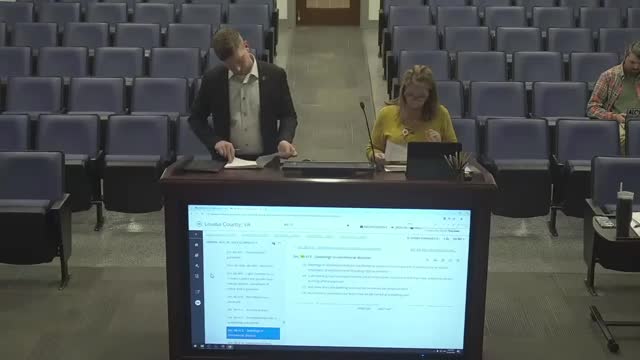New road regulations spark debate over developer responsibilities
October 11, 2024 | Louisa County, Virginia
This article was created by AI summarizing key points discussed. AI makes mistakes, so for full details and context, please refer to the video of the full meeting. Please report any errors so we can fix them. Report an error »

In a recent government meeting, officials discussed significant changes to the approval process for road plans and inspections, prompted by the Virginia Department of Transportation's (VDOT) withdrawal from its previous role in reviewing and approving such plans. The proposed changes aim to shift the responsibility of road certifications to third-party engineers, ensuring that new internal subdivision streets meet VDOT standards before being accepted into the state system.
The discussion highlighted that developers will now be required to hire their own engineers to create road plans, which will then be submitted to the county for review. This change comes in response to VDOT's decision to provide only \"concurrence\" rather than full approvals, leading to concerns about the quality and compliance of road construction. Officials emphasized the need for a third-party certification to maintain accountability and ensure that roads are built to the necessary standards.
Concerns were raised about the potential financial implications for developers, as the new requirements could increase costs associated with hiring engineers and conducting inspections. Additionally, there was a strong sentiment among officials that the county should not inadvertently assume ownership of roads that have not been formally accepted by VDOT. To mitigate this risk, it was suggested that ownership of the roads remain with the developer or homeowners association until VDOT officially adopts them.
The meeting also touched on the concept of \"devolution,\" where counties would take on more responsibility for maintaining their own roads, a practice already seen in some areas like Henrico County. Officials expressed the need for clear agreements regarding road maintenance and ownership to prevent future liabilities for the county.
Overall, the discussions underscored a shift in responsibility from VDOT to local developers and engineers, raising questions about the implications for road construction standards, costs, and county liabilities. As these changes are implemented, officials plan to advocate for clearer guidelines and support from state representatives to ensure that local needs are addressed effectively.
The discussion highlighted that developers will now be required to hire their own engineers to create road plans, which will then be submitted to the county for review. This change comes in response to VDOT's decision to provide only \"concurrence\" rather than full approvals, leading to concerns about the quality and compliance of road construction. Officials emphasized the need for a third-party certification to maintain accountability and ensure that roads are built to the necessary standards.
Concerns were raised about the potential financial implications for developers, as the new requirements could increase costs associated with hiring engineers and conducting inspections. Additionally, there was a strong sentiment among officials that the county should not inadvertently assume ownership of roads that have not been formally accepted by VDOT. To mitigate this risk, it was suggested that ownership of the roads remain with the developer or homeowners association until VDOT officially adopts them.
The meeting also touched on the concept of \"devolution,\" where counties would take on more responsibility for maintaining their own roads, a practice already seen in some areas like Henrico County. Officials expressed the need for clear agreements regarding road maintenance and ownership to prevent future liabilities for the county.
Overall, the discussions underscored a shift in responsibility from VDOT to local developers and engineers, raising questions about the implications for road construction standards, costs, and county liabilities. As these changes are implemented, officials plan to advocate for clearer guidelines and support from state representatives to ensure that local needs are addressed effectively.
Don't Miss a Word: See the Full Meeting!
Go beyond summaries. Unlock every video, transcript, and key insight with a Founder Membership.
✓
Get instant access to full meeting videos
✓
Search and clip any phrase from complete transcripts
✓
Receive AI-powered summaries & custom alerts
✓
Enjoy lifetime, unrestricted access to government data
30-day money-back guarantee

